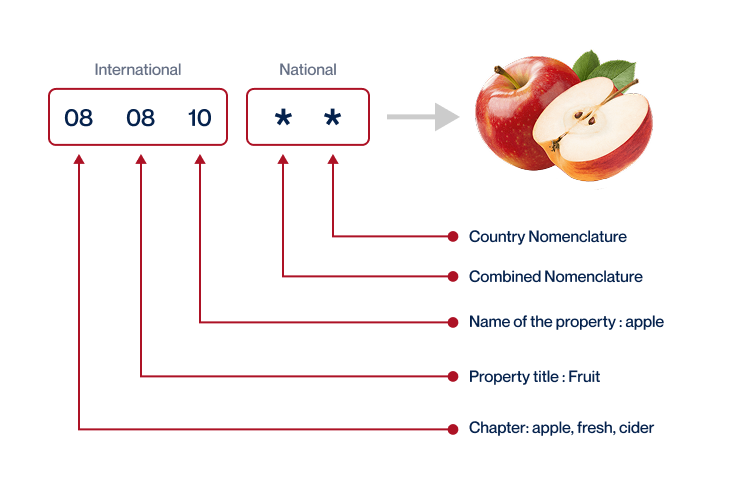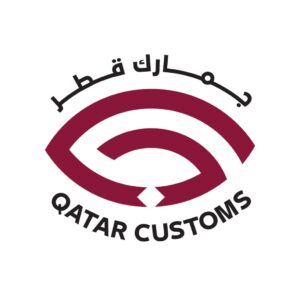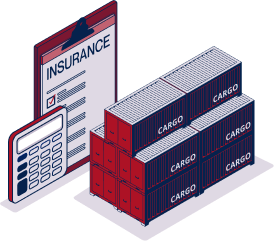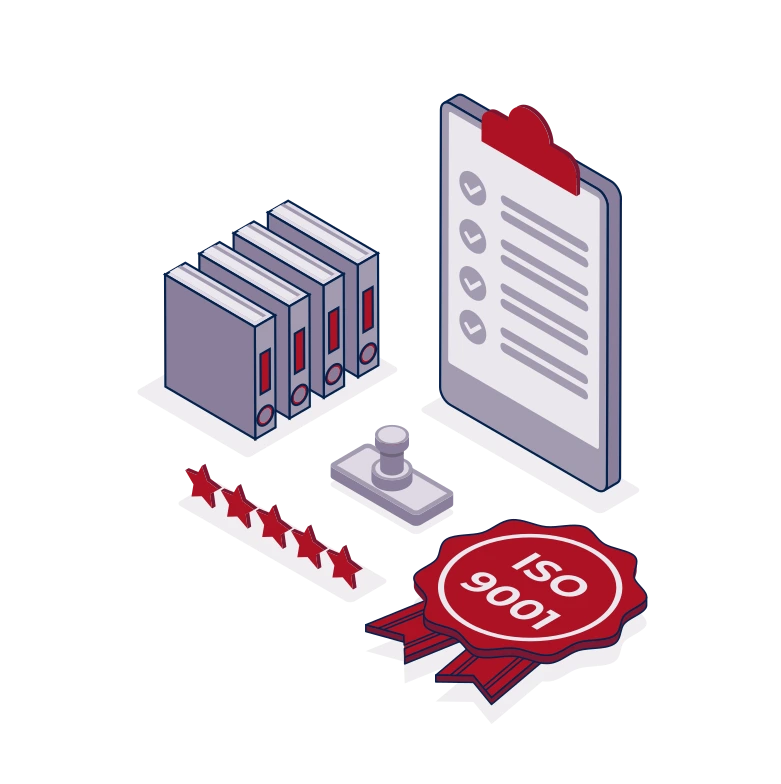Freight Shipping between Qatar and Croatia | Rates – Transit times – Duties and Taxes
So, you're looking to move goods between the land of hearty Burek and the home of delicious Machbūs? Well, strap in for a fascinating ride! The challenges of comprehending rates, transit times, and navigating inscrutable customs regulations can often feel like trying to decode an alien language.
This guide is here to simplify that journey and bring clarity to your shipping needs. Expect to learn about the different options for shipping, be it by air, sea, road, or rail, as well as a comprehensive outlook on customs procedures, details on duties and taxes. Moreover, you'll receive advice specifically curated for businesses to optimize their freight forwarding experience.
If the process still feels overwhelming, let DocShipper handle it for you! As your trusted international freight forwarder, we'll turn the challenges of international shipping into a streamlined success, right from your doorstep to your desired destination.
Which are the different modes of transportation between Qatar and Croatia?
Which are the different modes of transportation between Qatar and Croatia? Choosing a transport method between Qatar and Croatia isn't a matter of picking apples from a tree. Coastlines, deserts, and multiple countries stand in between, making certain shipping methods impossible. But don't worry. High-value air freight or affordable sea carriage? Imagine they're like express and regular mail delivery. The quickest can be pricier, but it sure speeds things up. The slower, more budget-friendly option? It gets everything there, just not in the blink of an eye. In the end, it's about finding the right balance for your shipping needs. Let's explore the options together.
Need help with your shipment?
Need assistance with your shipment? Dont hesitate to contact us even for a simple question. Choose the option that suits you
Live chat with an expert Chat on WhatsApp Free Quote 24hHow can DocShipper help you

Sea freight between Qatar and Croatia
In the bustling world of global commerce, Qatar and Croatia have carved a dynamic trade relationship, leveraging the long-standing tradition of Ocean shipping. The hubs of this transit web are the vibrant cargo ports of Hamad in Qatar, and Rijeka and Ploče in Croatia. Often, high-volume goods embark on this maritime journey, opting for the cost-effectiveness that trumps speed concerns.
But steering clear of obstacles in this sea of logistics can be daunting. Maybe you’ve been stumped by convoluted trade regulations or pulled your hair out over unexpected shipping delays. Mistakes are common, and the repercussions often costly. Yet, with the right knowledge, you can convert these common stumbling blocks into stepping stones.
The secret? Adhering to specific best practices and distinct specifications in your shipping process. Whether it’s packing guidelines or document-related intricacies – succeeding in this shipping route means playing the game by its rules; rules we’re about to delve deeper into. Welcome to the journey of mastering your maritime shipping between Qatar and Croatia.
Main shipping ports in Qatar
Hamad Port
Located in Umm Al Houl, near the town of Mesaieed, Hamad Port is a major node in the global trade network, boasting a shipping volume of over 2 million TEU annually. This port is vital for the import and export of goods, including machinery, vehicles and food products.
Key Trading Partners and Strategic Importance: Hamad Port’s key trading partners include China, India, and various countries in the Gulf Cooperation Council. Functioning as Qatar’s gateway for international trade, the port holds strategic importance in supporting the country’s economic diversification plans.
Context for Businesses: If you are a business considering expanding into the Middle Eastern or Asian markets, Hamad Port could be a strategic node in your logistics chain. Its modern infrastructures and capabilities, such as special cargo handling services and expanded shipping line services, offer significant logistics advantages.
Ras Laffan Port
Found in the north of Qatar, Ras Laffan Port is fundamental for the export of natural gas and other hydrocarbons, with a substantial shipping volume assisting in the facilitation of Qatar’s oil and gas industry.
Key Trading Partners and Strategic Importance: Major trading partners for Ras Laffan Port include Japan, South Korea, India, and China. The port’s strategic importance is underscored by its role in supporting Qatar’s leading position in the global gas market.
Context for Businesses: If your organization is engaged in the energy sector and looking to build robust supply chains in natural gas and oil, Ras Laffan Port should certainly be on your radar. The port’s direct access to the substantial gas reserves of the North Field presents a distinctive strategic advantage.
Mesaieed Port
Located in the south-east of Qatar, Mesaieed Port is crucial for the country’s industrial development, showcasing a shipping volume dedicated to raw material for Qatar’s heavy industries.
Key Trading Partners and Strategic Importance: Mesaieed Port has several key trading partners across Asia and the Middle East. Its strategic significance derives from its support for industries including petrochemicals, aluminum smelting, and cement production.
Context for Businesses: Businesses in the energy and industrial sectors may find Mesaieed Port critical for logistics. Its dedicated terminal for bulk goods, and proximity to Qatar’s industrial cities, grants it a pivotal role in facilitating international commerce.
Main shipping ports in Croatia
Port of Rijeka
Location and Volume: The Port of Rijeka is situated at the northernmost part of the Adriatic Sea. It is essential for trade with Central and Eastern Europe, handling over 344,091 TEU annually.
Key Trading Partners and Strategic Importance: The Port of Rijeka is a key trading partner with Italy, Germany, Austria, and Hungary. Its strategic location makes it vital for Mediterranean maritime routes and Pan-European Corridors.
Context for Businesses: If you’re planning to bridge markets in Eastern Europe, the Port of Rijeka might serve as an indispensable logistics pillar for your business considering its vast connectivity and strategic location.
Port of Split
Location and Volume: The Port of Split, located in the eastern shores of the Adriatic Sea, addresses a shipping capacity of around 5,000 TEU annually and is especially important for the ferry and passenger traffic.
Key Trading Partners and Strategic Importance: The port has established trading relationships mainly with Italy and Greece. Besides freight, it is strategically significant due to its heavy passenger and ro-ro traffic.
Context for Businesses: Should your business focus on passenger-related products or services, the Port of Split could provide a beneficial addition to your European distribution network with its considerable ferry and ro-ro capabilities.
Port of Ploče
Location and Volume: Situated at the southern tip of the Adriatic Sea, the Port of Ploče is Croatia’s main port for bulk cargo, handling nearly 60,000 TEU per year.
Key Trading Partners and Strategic Importance: The port’s key trading partners are Italy and Bosnia and Herzegovina, with an escalating trade relationship with Greece. Its strategic importance lies in its dominant role in bulk cargo and proximity to the Suez Canal.
Context for Businesses: If your trade revolves primarily around bulk goods, the Port of Ploče could be your gateway to the Mediterranean and beyond due to its significant bulk handling facilities and strategic positioning.
Should I choose FCL or LCL when shipping between Qatar and Croatia?
Embarking on the sea freight journey between Qatar and Croatia? Choosing the right container option – Full Container Load (FCL) or Less than Container Load (LCL), known as consolidation – can make a world of difference in your shipping success. Both hold strategic importance for cost, delivery time, and overall shipping efficiency. Our breakdown of FCL and LCL aims to guide you through this crucial shipping decision, ensuring your cargo reaches its destination in the best manner tailored to your needs. Armed with this knowledge, confidently chart your shipping course between these unique nations.
Full container load (FCL)
Definition: FCL, or Full Container Load, refers to a scenario in fcl shipping where your shipment fills up the entire fcl container.
When to Use: It's most economical and safe to choose FCL when you're shipping a large volume of goods—usually more than 13/14/15 CBM (Cubic Meter). This is because you're paying for the use of the entire container, such as 20'ft container or 40'ft container, regardless of whether it's full or not, and your shipment remains sealed from origin to destination, increasing the safety of your goods.
Example: Suppose you're a Qatar-based furniture manufacturer shipping an order of 100 armchairs to a department store in Croatia. Each chair might have a volume of about 0.15 CBM, resulting in a total of 15 CBM. In this case, choosing FCL would allow you to make the most of the container space and ensure the safest delivery.
Cost Implications: Request an fcl shipping quote beforehand. While FCL might have a higher upfront cost due to the whole container being reserved, it can actually be cheaper per unit because the cost is spread across a larger volume of goods. Also, the added security of having the container sealed often outweighs the price difference compared to LCL (Less than Container Load), where the container holds cargoes from multiple shippers.
Less container load (LCL)
Definition: Less than Container Load (LCL) shipping, also known as consolidation, is a method of freight transportation where your cargo shares space with other shippers' goods in the same shipping container.
When to Use: LCL shipping is an excellent choice for businesses shipping smaller volumes of cargo. It is especially ideal when the freight volume is between 13-15 CBM. This shipping method offers the flexibility of lower volume shipments, making it an economical option for smaller orders.
Example: Suppose you're a Croatian company that manufactures custom bicycle parts and you've received a medium volume order from a shop in Doha. As the goods don't fill a full container, LCL freight would be a cost-effective and suitable option.
Cost Implications: Since you're only paying for the space that your cargo occupies in the container, LCL can be more affordable for smaller shipments. However, it's essential to consider that the cost per cubic metre might be higher than FCL shipping. Plus, there are additional handling stages, which can result in slightly increased risks and longer delivery times.
Hassle-free shipping
Undecided between consolidation or a full container for shipping from Qatar to Croatia? DocShipper, your experienced freight forwarder, simplifies this choice. Our ocean freight experts assess essential factors like shipment size, budget, and urgency, providing guidance tailored to your needs. Make cargo shipping hassle-free! Reach out now for your free, no-obligation shipping estimation. Let's make the best shipping decision together.
How long does sea freight take between Qatar and Croatia?
Navigating the blue expanse between Qatar and Croatia typically involves a sea freight transit time of approximately 41 days. This time frame hinges on various factors, including the specific ports involved, the total weight of the shipment, and the nature of the goods being shipped. For a more precise estimate tailored to your unique needs, we highly recommend getting in touch with an experienced freight forwarder like DocShipper.
How much does it cost to ship a container between Qatar and Croatia?
Ocean freight rates can be as broad as the sea itself, with shipping costs between Qatar and Croatia typically fluctuating wide for each Cubic Meter (CBM). An array of factors like the points of loading and destination, carrier choice, nature of your goods, and monthly market movements all steer this pricing voyage. But don’t let these waves deter you. Our shipping specialists are your reliable crew. On this ocean of complexity, they chart the currents and wind patterns, working closely with you to provide the best rates tailored to your unique scenario. Each quote is crafted on a case-by-case basis, ensuring the smoothest and most cost-effective journey for your cargo.
Special transportation services
Out of Gauge (OOG) Container
Definition: Out of Gauge (OOG) container shipping is designed for unusually shaped or oversized cargo that can’t fit in standard shipping containers. OOG containers have cargo extending beyond their regular dimensions.
Suitable for: Large items like machinery parts, construction materials, or equipment that have non-standard dimensions and can’t be loaded in usual containers.
Examples: An out-of-gauge cargo could be a large silo or an oversized industrial machine being transported from Qatar to Croatia.
Why it might be the best choice for you: If your business deals in oversized or peculiar-shaped items that do not fit in standard containers, choosing OOG containers would ensure your goods arrive securely and undamaged.
Break Bulk
Definition: Break bulk shipping involves loose cargo load, individually loaded, and not inside a container. This method is one of the oldest forms of cargo transportation.
Suitable for: Goods too bulky or heavy to fit into any container.
Examples: Large or heavy items like construction equipment, turbines, or generators.
Why it might be the best choice for you: If your cargo is too sizable or heavy for container shipment, break bulk could be the ideal solution to ensure secure and efficient transportation of your goods.
Dry Bulk
Definition: Dry bulk shipping is used for homogenous bulk commodities like grain, coal, or iron ore which are transported unpackaged in large quantities.
Suitable for: Commodities in large volumes that aren’t packaged individually.
Examples: A business may want to ship large quantities of raw materials like gravel or sand between Croatia and Qatar.
Why it might be the best choice for you: If you’re dealing in widespread, homogenous wares, dry bulk could provide you the necessary capacity and efficiency.
Roll-on/Roll-off (Ro-Ro)
Definition: Roll-on/Roll-off (Ro-Ro) shipping uses ro-ro vessels designed to carry wheeled cargo such as cars, trailers, trucks, etc., driven on and off the vessel on their wheels.
Suitable for: Motorized and wheeled cargo.
Examples: A fleet of cars that need to be transported overseas.
Why it might be the best choice for you: If your business is involved in the automobile industry or any wheeled cargo, ro-ro could provide easy loading and unloading, saving you time and money.
Reefer Containers
Definition: Reefer containers are temperature-controlled containers primarily used for the transportation of perishable commodities.
Suitable for: Goods that require specific temperature during transportation.
Examples: Frozen foods, pharmaceuticals, or flowers may need reefer containers to maintain their quality.
Why it might be the best choice for you: If you’re trading products requiring certain temperature levels during shipment, opting for reefer containers can ensure they arrive in prime condition.
Trying to decide the right shipping option between Qatar and Croatia? Contact DocShipper for a free shipping quote in less than 24 hours. Our experts ensure that your cargo is handled professionally, promptly, and efficiently, leaving you free to focus on what you do best – running your business.
Air freight between Qatar and Croatia
When shipping from sweltering Qatar to historic Croatia, air freight is a rapid and dependable option. It’s like having a private express courier for your goods, ideal for smaller, high-value parcels such as swanky electronics or designer apparel – think a box of top-of-the-range Qatari headphones turning heads in Split.
However, here’s the catch – many shippers, in a hurry, miss the finer details. A common blunder is miscalculating shipping costs by using the wrong weight formula. It’s akin to estimating the price of a restaurant meal based on the meal’s picture size! This and other not-so-obvious aspects just might be turning a bargain shipping cost into a budget nightmare. Hang tight, because we’re about to breeze through these challenges, ensuring your shipments aren’t blowing a hole in your wallet.
Air Cargo vs Express Air Freight: How should I ship?
Wondering how to swiftly send your goods from Qatar to Croatia? Choosing the right service can be daunting, but let’s clear things up. ‘Air cargo’ means your goods hitch a ride on a commercial airline with passengers, while ‘express air freight’ is like your package taking a private jet – it’s on dedicated planes that only carry cargo. The key lies in finding what suits your business best. Join us as we delve deeper into this in the coming sections.
Should I choose Air Cargo between Qatar and Croatia?
Considering your budget and size of cargo, air cargo might strike the impeccable balance for your shipping needs from Qatar to Croatia. Notably, airlines like Qatar Airways and Croatia Airlines are reliable players, offering cost-effective solutions. While longer transit times could be a concern due to fixed schedules, remember, air cargo becomes increasingly attractive for loads surpassing 100/150 kg (220/330 lbs). This option prioritizes your financial comfort while ensuring an efficient shipping process. Choose air cargo for a sensible blend of cost-effectiveness and reliability, despite longer transit times. Think smart, ship wise.

Should I choose Express Air Freight between Qatar and Croatia?
Express air freight, a specialized service employing dedicated cargo planes sans passengers, is an excellent solution for shipping less than 1 CBM or 100/150 kg (220/330 lbs) of cargo. It offers fast, reliable transportation with firms like FedEx, UPS, and DHL providing worldwide services. If your business needs small shipments delivered quickly between Qatar and Croatia, this could be perfectly suited for you. Choosing this method ensures agility, speed, and all-round security for your goods, making it an advantageous choice.

Main international airports in Qatar
Hamad International Airport
Cargo Volume: Handling around 2 million metric tonnes of cargo annually, Hamad International Airport is a principal air cargo hub in Qatar.
Key Trading Partners: The airport connects Qatar with major global markets including countries in the European Union, East Asia, and North America.
Strategic Importance: Located in Doha, the capital city of Qatar, it operates as the main gateway for international air trade in the region. Its strategic location gives businesses a key advantage in minimizing transit times.
Notable Features: Hamad International Airport is known for its state-of-the-art cargo terminal, capable of handling large and diverse types of goods including temperature-sensitive and oversized cargo. Its efficiency and modern infrastructure aid in seamless freight forwarding.
For Your Business: If speed, efficiency, and accessibility to global markets are your priority, this airport’s comprehensive facilities and connectivity might make this a preferred point of entry or exit for your goods to and from Qatar. It’s equipped to handle complex logistics, tailoring services based on the nature of your business and the specific goods you plan to ship.
Doha International Airport
Cargo Volume: Although smaller and older than Hamad International Airport, Doha International Airport handles a substantial amount of cargo, augmenting Qatar’s air freight capacity.
Key Trading Partners: Primarily connects with Middle Eastern countries, alongside some connections to key Asian and European markets.
Strategic Importance: Before the opening of Hamad International Airport, this was the main airport in Doha. Despite being older, it remains a significant player in the country’s logistics landscape.
Notable Features: Doha International Airport houses a number of cargo handling facilities and offers services for a wide range of cargo including animals, dangerous goods and valuables.
For Your Business: If you’re considering flexibility in routing and handling unconventional cargo types, Doha International Airport may cater to your specific needs. Its legacy and continued operation afford more choice and flexibility in coordinating your freight forwarding strategy.
Main international airports in Croatia
Zagreb Airport
Cargo Volume: Annually, Zagreb Airport handles approximately 11,500 tons of cargo.
Key Trading Partners: The city is linked with key European trading partners like Germany, Italy, and Austria, but it also maintains strong trading relations with China and the USA.
Strategic Importance: As Croatia’s largest and busiest airport, Zagreb Airport serves as the country’s main international gateway. Its central location in the capital makes it a significant hub for handling and distributing goods across the country.
Notable Features: The airport recently underwent a large scale renovation, resulting in a modernized infrastructure and advanced handling capabilities. It also has a dedicated cargo terminal.
For Your Business: If your business mainly targets central or southeastern European markets, utilizing Zagreb Airport for your air freight needs could provide an effective solution due to its robust connections within Europe.
Split Airport
Cargo Volume: Split Airport processes around 2,500 tons of cargo annually.
Key Trading Partners: Major trading partners include Germany, Italy, Austria, and Belgium.
Strategic Importance: Split Airport, the country’s second-largest airport located on the Adriatic coast, offers strategic advantages for targeting European beach destinations and the booming summertime consumer market.
Notable Features: Despite its relatively small size, the airport has a cargo terminal and is well-equipped for cargo operations.
For Your Business: If your products cater to the tourism market, Split Airport is an ideal choice due to the high number of tourists visiting Split, particularly during the summer.
Pula Airport
Cargo Volume: Pula Airport handles roughly 1,200 tons of cargo each year.
Key Trading Partners: Pula Airport maintains ties with countries across Europe, particularly Germany and Italy.
Strategic Importance: Located at the tip of Istrian peninsula, Pula Airport presents a strategic advantage for entry into the Adriatic region and northeastern Italy.
Notable Features: The airport features a cargo facility and often hosts cargo charter flights.
For Your Business: If your business requires access to European sea routes or to the Italian market, Pula Airport could prove a beneficial addition to your logistics strategy.
Dubrovnik Airport
Cargo Volume: Dubrovnik Airport’s cargo segment sees approximately 411,000 tons annually.
Key Trading Partners: Key trading partners include France, the UK, and Germany.
Strategic Importance: The airport plays a crucial role for tourism due to its location in Dubrovnik – a popular destination for international tourists.
Notable Features: The airport recently expanded its passenger terminal which implicitly enhanced its air freight capacity.
For Your Business: If your goods target the premium tourism market, using Dubrovnik Airport could be an excellent strategy owing to the city’s popularity among high-end tourists.
Rijeka Airport
Cargo Volume: Rijeka Airport handles around 1,200 tons of cargo per year.
Key Trading Partners: Most of its cargo operations involve countries in Western Europe and the Middle East.
Strategic Importance: As the country’s northernmost airport, it serves as a useful entry point into Central Europe.
Notable Features: Its open-air storage area is capable of holding oversized cargo, making it stand out among other airports.
For Your Business: Rijeka Airport could serve as an efficient point of entry if your business deals with large-scale cargo or if you specifically target markets in Central Europe.
How long does air freight take between Qatar and Croatia?
Typically, air freight between Qatar and Croatia takes around 3-5 days. However, these times can fluctuate depending on various factors such as the specific airports used, the weight of the goods, and their nature, among other considerations. For the most accurate timelines tailored to your shipment’s unique requirements, it is advisable to consult with a freight forwarder like DocShipper.
How much does it cost to ship a parcel between Qatar and Croatia with air freight?
Air freight shipping rates between Qatar and Croatia typically range from $3 to $6 per kg. Keep in mind that providing an exact cost is complicated due to variable factors such as the distance between departure and delivery airports, the dimension and weight of packages, as well as the nature of the shipped items. But don’t worry, our experienced team will assist you in obtaining the best cost possible, as we quote rates on a case-by-case basis. Need a precise quote? Contact us to receive a free quote in less than 24 hours.
What is the difference between volumetric and gross weight?
Gross weight refers to the actual physical weight of an item, which is weighed on a scale and typically measured in kilograms (kg). Volumetric weight or dimensional weight, on the other hand, reflects the package’s density, considering its length, width, and height.
For air cargo, calculating the volumetric weight involves multiplying the package’s dimensions (length x width x height) in centimeters and then dividing by a standard figure, often 6000. If the same package weighs 30 kg when put on a scale, that’s its gross weight. For a parcel measuring 40cm (length) x 50cm (width) x 60cm (height), the volumetric weight will be (40x50x60)/6000 = 20kg. This translates to 44 lbs, whereas the gross weight is 66 lbs.
Express air freight services usually use a smaller divisor, possibly as low as 5000, making the volumetric weight higher when compared to air cargo. The same package would have a volumetric weight of (40x50x60)/5000 = 24kg or roughly 53 lbs.
The crucial factor here is that air freight companies charge based on whichever weight is higher for your shipment. This concept is essential as it ensures efficient utilization of cargo space and fair pricing for all types of items—light, heavy, large, or small.

Door to door between Qatar and Croatia
Navigate the complexities of shipping between Qatar and Croatia with ease by opting for Door to Door services – an all-inclusive, hassle-free shipping solution. Reap benefits like easing logistical burdens, time efficiency, and direct communication – it’s convenience packaged just for you. So throw your shipping concerns overboard – let’s dive headfirst into the many perks of Door to Door shipping.
Overview – Door to Door
Streamlining your international shipping needs from Qatar to Croatia has never been easier. Door to Door service is an all-rounded, hassle-free logistics solution that takes away the stress of grappling with complex customs laws, administrative tasks, and varied transport methods. As our popular DocShipper service, this method perfectly addresses your potential challenges and contributes to smooth, fast deliveries.
However, while it’s convenient, you may find it slightly costlier. Despite this, embracing Door-to-Door is like handing over the intricacies of logistics to a trusted partner. Providing peace of mind, time-saving, and an overall stress-free experience are the crucial values you stand to gain. It’s your path to effortless international trade.
Why should I use a Door to Door service between Qatar and Croatia?
So, you’re losing sleep over shipping logistics? It’s like a bad episode of teleported Tetris, isn’t it? Well, fret no more! Our Door to Door service from Qatar to Croatia is here to save your sanity, and let’s dive into the five reasons why!
1. Shake off the Stress: You can leave the worry of organizing different stages of your shipment’s journey to us. We handle everything, literally from your doorstep to the receiver’s.
2. Time is of The Essence: If urgency is your thing, then Door to Door service is your lifesaver. We ensure on-time pickups and consistent updates on the shipment progress, leading to timely deliveries.
3. Special Care for Complex Cargo: Delicate, high-value, or uniquely-shaped goods? No problem! This service provides the specialized care required for such complex cargo, keeping it safe amid all the hustle.
4. From Start to Finish, We’ve got it Covered: We manage all customs procedures, documentation, trucking to and from ports. We do the heavy lifting so that your business doesn’t have to.
5. Unpack the Convenience: Imagine being the destination, minus all the travel! Your shipment arrives straight to the doorstep of the destination, making the process super convenient for you and the receiver.
So there you have it! Shipping goods from Qatar to Croatia could not only be stress-free but could feel like a walk in the park. Being in control of your cargo doesn’t mean you need to be in control of everything. Let us handle the logistics, you handle the success!
DocShipper – Door to Door specialist between Qatar and Croatia
Effortlessly ship your goods from Qatar to Croatia with DocShipper’s comprehensive door-to-door service. Our proficient team works tirelessly to ensure every detail is handled – from packing and transportation, to intricate customs processes – offering an experience that is as smooth as it is seamless. You won’t have to lift a finger. Each client benefits from a dedicated Account Executive, further easing the process. Keen to explore more? Request a free estimate within 24 hours or speak with our consultants at no cost. Let us do the heavy lifting for you.
Customs clearance in Croatia for goods imported from Qatar
Mastering customs clearance, the process of getting goods through Croatia’s customs so they can enter the market, is a real challenge fraught with potential hidden costs. It’s a complex task involving understanding a host of duties, taxes, quotas, and licenses. Unforeseen issues could even stall your goods in customs, disrupting your operational flow.
The following sections in our guide will dissect these areas to provide you with adequate knowledge. Don’t fret, as DocShipper is here to streamline this labyrinthine process for all kinds of goods, wherever they’re shipped from. Be ready to provide the origin, value, and HS Code of your goods for an accurate cost estimate. Reach out to our team anytime. Forward on with confidence.
How to calculate duties & taxes when importing from Qatar to Croatia?
In the fascinating world of international shipping, knowing how to accurately estimate duties and taxes is a valuable skill. To do this, keep in mind that your calculation will need to consider the origin country where the goods were produced or manufactured, the Harmonized System (HS) codes that classify your goods, the customs value based on Incoterms, the tariff rate applicable to your product in Croatia, and any other taxes or additional fees relevant to your products.
You might feel like a seasoned detective, as the first step in this journey is sleuthing out the bona fide origin country of your goods. This initial location scouting is a crucial first move in your strategy, setting the stage for the rest of your customs calculations. With this information in hand, you’re ready to navigate the ins and outs of importing from Qatar to Croatia. Let’s dive in!
Step 1 – Identify the Country of Origin
Knowing your product’s country of origin, in this case, Qatar, is the kick-off point in the customs process.
1. Trade Agreements: Qatar and Croatia have several trade agreements that impact customs duties. Knowing the origin allows you to benefit from reduced or even zero rates under these pacts.
2. Import Restrictions: Each country has unique prohibitions and restrictions; for example, certain Qatari goods might be restricted in Croatia. Awareness ensures you avoid costly customs pitfalls.
3. Customs Duties: Duties can vary based on origin, even for identical products. The origin distinguishes between which rate applies.
4. Trade Compliance: Accurate origin declaration helps avoid penalties from customs authorities for trade compliance violations.
5. Product Planning and Pricing: Duties impact the final product’s cost, consequently, your pricing strategy.
Now, put this premier step at the center of your import strategy. Familiarize yourself with Qatar-Croatia trade agreements, understand import restrictions and focus on accurate origin declaration to ensure smooth customs experience. With precise knowledge, you can make a smarter decision about which goods to import and how to set competitive prices. Remember, the right start creates a ripple effect on your entire import process. Armed with these insights, you are ready for the next step: Getting the HS code.
Step 2 – Find the HS Code of your product
A Harmonized System (HS) code is a standardized coding system designed by the World Customs Organization to classify products. It is used by customs authorities around the world to identify products for the purposes of assessing duties and taxes.
Usually, the most straightforward way to determine the HS code of your product is to ask your supplier, who should be familiar with the products they’re exporting and the related regulations.
However, if this isn’t possible, we can guide you through an easy step-by-step process:
1. Navigate to a reliable HS lookup tool, such as the Harmonized Tariff Schedule.
2. Once on the site, enter the product name in the search bar.
3. Check the Heading/Subheading column, where you can find the HS code of your product.
It’s important to note that accuracy when determining your HS code is vital. Any discrepancies or inaccuracies can lead to delays in your shipments and may even result in potential fines.
Remember, the correct identification of your product’s HS code is a crucial step in ensuring smooth and timely customs clearance.
Here’s an infographic showing you how to read an HS code. Understanding the structure of HS codes will help you identify the correct one for your products.

Step 3 – Calculate the Customs Value
Now, let’s unpack the concept of customs value. It’s not just about the price tag on your goods; think of it as the ‘trip cost’ of your shipment from Qatar to Croatia. This total cost constitutes the CIF value, combining the price of your items, their international shipping cost plus insurance charges. For instance, if you’re shipping goods worth $100, and the international shipping cost is $50 with an additional $10 insurance, then your customs value would equate to $160 (i.e., $100+$50+$10).
So, remember to consider these elements while calculating the customs value to ensure smooth customs clearance in Croatia. This approach will assist in accurately estimating potential customs duties and prevent unexpected shipping expenses. Remember, accurate budgeting is crucial to successful international shipping!
Step 4 – Figure out the applicable Import Tariff
An import tariff is essentially a tax that your imported goods will be subjected to once they reach the destination country. Croatia falls under the European Union, meaning its tariffs are governed by the EU customs law. To determine the specific tariff that applies to your goods, you can use the TARIC Consultation Tool, also known as the TARIC System- European customs.
Start by entering the HS code of your goods, which you would have previously identified, as well as the country of origin being Qatar. This tool will then present the duties and taxes that apply to your product.
As a practical example, let’s say you are importing a product with an HS code ‘69101000’ (ceramic sinks and washbasins). In the TARIC system, this will generate a Most Favored Nation (MFN) duty rate of 4%. Let’s also assume the Cost, Insurance, and Freight (CIF) value of your shipment is $1000. To calculate your import duty, apply the tariff rate of 4% to your CIF value, which results in an import duty of $40.
This process allows you to calculate the financial obligations involved in shipping your goods from Qatar to Croatia and will be an essential step in ensuring a smooth shipment process.
Step 5 – Consider other Import Duties and Taxes
When you’re importing goods from Qatar to Croatia, you’re likely aware of the standard tariff rate, but there are other import duties to consider as well that can sometimes be hefty, and they depend greatly on the product and country of origin. Take excise duty, for instance, this tax is applicable to luxury goods like tobacco or alcohol. Let’s say you’re bringing in tobacco, you could pay around $300 for every 1000 cigarettes as an excise duty – remember, this is a hypothetical example and actual rates may vary.
Then, you might come across anti-dumping duties. These are applied when goods are deemed to be sold at less than their normal value and can protect against market distortion. For instance, if steel is dumped from China, an extra duty might be applied to companesate.
Lastly, it’s hard to overlook the most typical import charge: VAT. Croatia’s standard VAT rate is 25%. So if your declared value of goods is $10,000, you’d be paying roughly $2,500 as VAT. The formula looks something like this: value of goods (and sometimes shipping & insurance) x VAT rate = VAT payable.
Be sure to check the exact rates and apply them to your business situation. This will help you anticipate costs and make more informed decisions.
Step 6 – Calculate the Customs Duties
Calculating customs duties when importing goods from Qatar to Croatia largely depends on the customs value of the goods, implementation of VAT, anti-dumping taxes, and Excise Duty. Customs value (cost of goods+shipping+insurance) forms the base value for customs duties calculation. For example, if your goods’ custom value is $1000, with a customs duty rate of 10%, your duty will be $100.
In a scenario where VAT is involved, it’s calculated on the total of the customs value and customs duty. Say, your custom’s value is $2000 with duty at 10% ($200) and the VAT rate is 20%, you’d pay a VAT of $440.
For goods subject to customs duties, VAT, anti-dumping taxes, and Excise Duty, all taxes are combined to assess the final customs value. Let’s assume a customs value of $3000 with a duty rate of 10% ($300), VAT rate of 20%, an anti-dumping tax of 5% ($150), and an Excise Duty rate of 5% ($150). Considering these, VAT becomes $720.
Doing this yourself can be quite complicated. With DocShipper’s customs clearance services, we ensure you only pay what is necessary. Contact us for a free quote in under 24 hours and let us streamline your goods’ journey–one step at a time.
Does DocShipper charge customs fees?
Customs duties can be confusing. While DocShipper, being a reputable custom broker in Qatar and Croatia, handles your customs clearance, we don’t charge you any customs duties. The customs duties and taxes go directly to the government. What we do charge is a minimal customs clearance fee. To ensure transparency, we provide all documents produced by customs – it’s our way of proving you’re only paying what the customs office charges. It’s all on the record, so there are no unpleasant surprises. This clear segregation helps you budget accurately and makes the whole shiping process seamless.
Contact Details for Customs Authorities
Qatar Customs

Official name: Qatar General Authority of Customs. Official website: www.customs.gov.qa/
Croatia Customs
Required documents for customs clearance
Unpacking the mystery of customs paperwork? This section illuminates must-have documents like the Bill of Lading, Packing List, Certificate of Origin, and CE standard conformity documents. Ditch the confusion and sail through customs with ease. Understanding these essentials can transform a complex process into a walk in the park. Let’s tackle this challenge together!
Bill of Lading
A Bill of Lading, your ‘golden ticket’ in freight forwarding, sets the ball rolling for your shipment from Qatar to Croatia. It’s not just a receipt for goods or evidence of the contract, but marks the pivotal moment of transfer ownership. It’s like a road map, detailing your cargo’s route and buoying it from the arid lands of Qatar to Croatia’s serene coastline.
Opting for telex (electronic) release expedites this process, freeing you from the constraints of paper documents – a virtual high-five for your commitment to seamless, eco-friendly logistics. And for your air cargo, the Air Waybill (AWB) plays a similar role, keeping your shipment on track. Master the usage of these documents and you’re a step closer to outsmarting the intricacies of international shipping.
Packing List
When you’re managing shipping goods from Qatar to Croatia, think of the Packing List as your project’s ‘table of contents’. It’s you, the shipper’s responsibility, to make each item, type of product, quantity, and weight crystal clear. This isn’t just a fancy list; imagine needing to retrieve a specific package from a container – your Packing List helps in such critical situations.
Plus, it aids customs officials in both countries, streamlining the clearance process, whether you’re shipping via sea or air. For instance, if you’re transporting auto-parts, each set of wheels, engine, mirrors, and the tiniest bolt need to be accounted for. Get this right and you’re well on your way to a smoother shipping experience.
Commercial Invoice
The Commercial Invoice can often be the lynchpin for smooth customs clearance when shipping from Qatar to Croatia. This crucial document should clearly state the product’s complete description, its HS Code, total value, country of origin, and terms of delivery. Imagine it as your goods’ passport; any inaccuracies might cause delay or even rejection at customs. Consistency is key! Ensure that the information aligns perfectly with that on your Bill of Lading or Airway Bill.
For instance, if you’re shipping 5000 ballpoint pens, listed under the HS code 9608.10, make sure these details match across all your documents. Mastering your Commercial Invoice can turn potential customs headaches into breezy clearances. So, double-check, be precise and stay consistent. It’s all in the detail!
Certificate of Origin
When shipping goods between Qatar and Croatia, a key component is the Certificate of Origin. This document proves where your goods have been manufactured and is crucial in leveraging preferential customs duty rates. Let’s say you’re shipping aluminum panels produced in Doha to Zagreb. By stating Qatar as the country of manufacture in your Certificate of Origin, you could score a lower customs rate under the respective trade agreements. So remember, accurately citing the manufacturing origin isn’t just about compliance—it could save your business a pretty penny in customs duties. It’s essentially your passport to smarter, cost-effective shipping.
Certificate of Conformity (CE standard)
When you’re shipping goods from Qatar to Croatia, you’ll need a Certificate of Conformity (CE standard). This certificate proves your product meets health, safety, and environmental protection standards within the European market, and yes, Croatia is part of Europe. Don’t confuse the CE marking with quality assurance, it’s more about compliance.
For example, if you’re shipping electronics, they need to show CE marking to clear customs without hitch. Unlike the US where different standards may apply state by state, the CE marking is valid across all EU member states. So, before your goods leave Qatar, ensure they have this certification. It relieves stress at customs and boosts your product’s appeal to EU consumers, who view it as a safety seal.
Your EORI number (Economic Operator Registration Identification)
If you’re shipping between Qatar and Croatia, obtaining an EORI number is a pivotal step. EORI, or Economic Operator Registration Identification, is a unique code given to businesses or individuals involved in goods import/export within the European Union—yes, Croatia is part of it. It’s a system designed to track goods moving in and out of EU borders, ensuring smooth and legal transport.
Imagine getting stuck at Croatian customs, all because your imports or exports weren’t identifiable. Avoid such hurdles by registering for an EORI number via your home EU country’s customs website. With an EORI, you’ll be officially identifiable in the eyes of customs officials, expediting your shipping process and making your business transactions as seamless as possible.
Get Started with DocShipper
Prohibited and Restricted items when importing into Croatia
Avoid legal headaches and disruption in your supply chain! Understanding what commodities you can’t legally import into Croatia is crucial. From prohibited items to those that require special permissions, let’s break it all down to ensure your business operates without any unwanted hassles.
Are there any trade agreements between Qatar and Croatia?
Indeed, there are no Free Trade Agreements (FTAs) or Economic Partnership Agreements (EPAs) currently established between Qatar and Croatia. This means that standard international trade rules apply, which might impact your shipping costs or operations. However, with both nations having expressed interest in enhancing bilateral relations, opportunities for trade talks and future agreements may arise. Keep a close eye on these developments, as they can reshape your shipping strategy considerably.
Qatar – Croatia trade and economic relationship
The exchange between Qatar and Croatia, two historically connected allies, has created a strong trade and economic relationship over the years. Starting with the Croatian independence recognition by Qatar in 1992, this tie has evolved with joint ventures in the sectors of energy, tourism, and real estate.
In 2022, Qatar’s investment in Croatia stood at over $500 million, primarily in energy infrastructure. On the trade front, bilateral exchange reached over $28.4 million in recent years with a continuous upward trend. The primary commodities exported from Qatar to Croatia are petroleum-derived products, while Croatia’s main exports to Qatar are machinery, electrical and medical equipment.
This strengthening growth holds opportunities, especially as Qatar aims to become a leading global investor and Croatia’s strategic geographical position offering accessibility to European markets. Indeed, the dynamic and prospering trade relations of these two countries demonstrate the value of international partnership and commerce.
Your first steps with DocShipper
Additional logistics services
Warehousing
Finding reliable, condition-appropriate warehousing in Qatar or Croatia can be a bit of a puzzle, especially when your goods need that extra TLC, like temperature-controlled environments. Our detailed warehousing services offer the perfect puzzle solution, ensuring your products are always in optimal condition. Seek rest and assurance with our top-tier storage solutions. More info on our dedicated page: Warehousing.
Packing
Mastering the art of packaging and repackaging is crucial when shipping from Qatar to Croatia. From heavy machinery to fragile ceramics, a reliable agent ensures your goods are properly protected and meet varying industry standards. Imagine a scenario where high-quality Qatari liquefied natural gas needs a safe passage to Croatia; correct packaging ensures safe, leak-free delivery. This service customizes each packaging task to your product, guaranteeing a smoother and risk-free transit. Learn more on our page: Freight packaging.

Transport Insurance
As a protective shield, cargo insurance shields your goods from any loss or damage during the long and unpredictable transit journey, unlike fire insurance that only covers fire-related damages. For instance, it can safeguard your shipment from potential issues like damage due to rough handling or theft. Investing in cargo insurance is a wise move to circumvent substantial financial loss and adds a layer of security to your business operations. Learn more on our dedicated page: Cargo Insurance.

Household goods shipping
When shipping personal effects from Qatar to Croatia, like your grandad's antique clock or your cherished painting, peace of mind is essential. Handling these with professional care and adaptability is our specialty. Imagine safeguarding your family heirloom with expert packing and treating your robust home theater with the nimble fingers it needs; that's what you get with our Personal Effects Shipping.
Procurement in Thailand
Looking to manufacture in Asia, East Europe, or beyond? DocShipper can help bridge the gap, functioning as your eyes and ears on the ground. From finding the right suppliers, to handling the whole procurement process, we mitigate language barriers and guide you every step of the way. Experience more ease in your quest for overseas sourcing. Curious about how this works? More info on our dedicated page: Sourcing services.

Quality Control
Quality inspections are a crucial step when exporting from Qatar to Croatia. This process safeguards your business reputation by ensuring your goods meet both countries' standards before they hit the road. Think about it; noticing a production error post-shipment to Zagreb would mean cost-heavy returns. These checks, conducted on-site in Doha, help you dodge such financial bullets and keep client satisfaction high.

Conformité des produits aux normes
Compliance is key in the logistics game - miss a beat and you could face penalties or shipment delays. With our Product Compliance Services, we cover you fully. We test your goods in our labs for certifications, ensuring they fit right into any regional regulations. It's like passing the baton in a relay race; we help you make a smooth, compliant handover every time.







